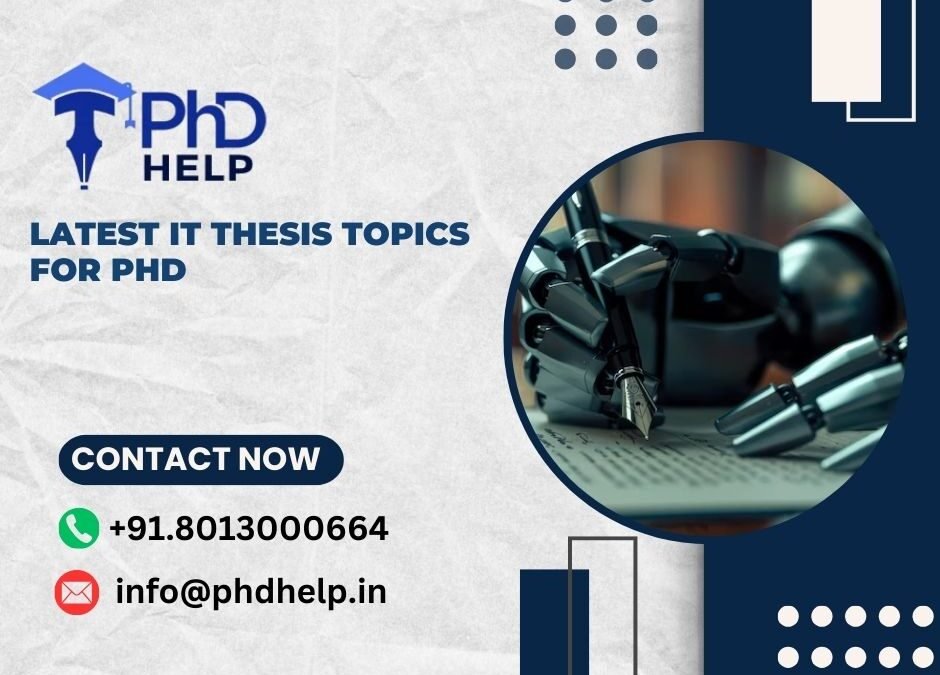Latest IT Thesis Topics for PhD
Latest IT Thesis Topics for PhD. In today’s digitally empowered world, Information Technology (IT) plays a pivotal role in shaping industries, transforming societies, and driving innovation. For doctoral scholars, choosing the right PhD thesis topic in IT can determine not only the academic trajectory but also future contributions to cutting-edge advancements in technology. The following list presents the most relevant, emerging, and high-impact IT research topics for PhD candidates. These topics span from artificial intelligence to cybersecurity, data science to edge computing, ensuring alignment with both academic depth and industry relevance.
Artificial Intelligence and Machine Learning
1. Explainable AI (XAI) in Critical Applications
Research how to make machine learning models more interpretable and transparent in high-stakes areas like healthcare, finance, and legal systems.
2. Federated Learning for Privacy-Preserving AI
Study decentralized machine learning models that preserve data privacy while enabling collaborative model training across multiple devices.
3. AI-Powered Decision Support Systems
Develop advanced AI algorithms that assist in complex decision-making processes for industries like logistics, urban planning, and medicine.
Cybersecurity and Privacy
4. Quantum-Resistant Cryptographic Algorithms
Explore new encryption techniques that are secure against quantum computing threats, ensuring future-proof digital communication.
5. Intrusion Detection Using Deep Learning
Design intelligent systems to detect cyber threats and network anomalies using deep neural networks and unsupervised learning.
6. Privacy-Preserving Data Mining
Research techniques like homomorphic encryption, differential privacy, and secure multi-party computation to maintain privacy during data analytics.
Data Science and Big Data Analytics
7. Real-Time Analytics in Streaming Big Data
Study how to process and analyze high-velocity data streams using frameworks such as Apache Flink, Apache Kafka, and Spark Streaming.
8. Data Quality Enhancement in Big Data Environments
Investigate methodologies for data cleansing, validation, and integration to ensure high-quality input for predictive analytics.
9. Automated Data Governance in Data Lakes
Design systems that provide real-time data classification, access control, and compliance enforcement in massive unstructured data environments.
Cloud Computing and Virtualization
10. Cloud Resource Optimization Using Reinforcement Learning
Develop algorithms that optimize computational resource allocation in cloud environments for cost-efficiency and performance.
11. Multi-Cloud Security Architecture
Explore techniques to secure data and applications distributed across multiple cloud service providers.
12. Energy-Aware Virtual Machine Migration in Cloud Data Centers
Investigate ways to reduce energy consumption in cloud data centers using AI-driven VM migration strategies.
Internet of Things (IoT)
13. Lightweight Security Protocols for IoT Devices
Develop encryption protocols that balance security and resource constraints of low-power IoT devices.
14. Smart City Infrastructure Optimization Using IoT
Explore how IoT can enhance urban resource management, including smart traffic, waste collection, and energy distribution.
15. Interoperability Standards for Industrial IoT (IIoT)
Study challenges in interconnecting heterogeneous industrial systems and creating standardized communication protocols.
Edge and Fog Computing
16. Task Offloading Strategies in Edge Computing
Analyze methods to dynamically distribute computing tasks between edge nodes and cloud servers for optimized latency and energy use.
17. Security Challenges in Fog Architectures
Explore attack vectors, encryption mechanisms, and trust management in fog computing environments.
18. AI at the Edge: Embedded Intelligence
Design and implement machine learning models that can function efficiently on resource-constrained edge devices for applications like smart cameras or wearables.
Blockchain and Distributed Ledger Technologies
19. Blockchain Integration in Supply Chain Management
Research how blockchain can ensure transparency, traceability, and accountability across the supply chain.
20. Scalable Consensus Mechanisms for Blockchain Networks
Develop new consensus protocols that maintain security and decentralization while achieving higher transaction throughput.
21. Blockchain for Identity and Access Management
Study how blockchain can be used for secure, decentralized user identity verification and access control.
Human-Computer Interaction (HCI) and UX Design
22. Brain-Computer Interfaces for Assistive Technology
Explore the use of neural signals to control devices and software, particularly for users with disabilities.
23. Augmented Reality in Educational Technology
Investigate the effectiveness of AR tools in engaging students and enhancing learning outcomes in various educational settings.
24. Emotion-Aware Computing for Personalized UX
Design systems that detect user emotions via facial recognition, voice analysis, or behavioral data to adjust UI and content dynamically.
Software Engineering and Agile Practices
25. AI-Augmented Software Testing
Study how machine learning can be applied to automate unit, integration, and regression testing processes in agile environments.
26. Microservices Architecture Performance Optimization
Explore tools and strategies to improve performance, resilience, and scalability in microservices-based application architectures.
27. DevSecOps Implementation in Large Enterprises
Investigate the integration of security practices into DevOps pipelines for continuous compliance and secure software delivery.
Natural Language Processing (NLP)
28. Multilingual NLP for Low-Resource Languages
Develop language models for underrepresented languages, enabling better translation, sentiment analysis, and voice interaction capabilities.
29. Bias Detection and Mitigation in NLP Models
Examine the presence of social, gender, or racial biases in language models and propose strategies to mitigate them.
30. Conversational AI for Healthcare Applications
Design chatbots and virtual assistants tailored for patient support, appointment scheduling, and mental health interventions.
Conclusion: Pioneering the Next Digital Frontier
The evolution of Information Technology is relentless, and PhD scholars have the opportunity to lead the future with transformative research. These latest PhD thesis topics in IT are carefully curated to address present-day challenges while forecasting the innovations of tomorrow. Choosing any of these topics allows for academic contribution, societal impact, and career advancement in a world driven by digital solutions.
Thank you for read our blog “Latest IT Thesis Topics for PhD”
Also read our more BLOG here
For PhD writing help Contact: +91.8013000664 || info@phdhelp.in

